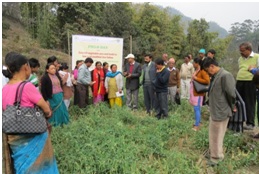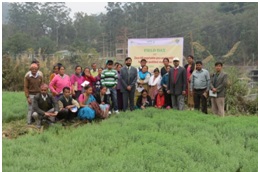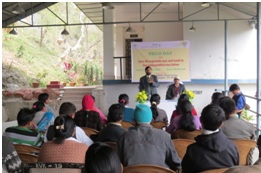Zero till vegetable pea in puddle rice fallow demonstrated to the progressive farmers
KrishiVigyan Kendra, East Sikkim, Ranipooland ICAR Sikkim Centre, Tadong organized a Field Day on “Zero till vegetable pea and lentil cultivation in low land puddled rice fallow” under NICRA (National Initiative on Climate Resilient Agriculture) project at KVK Marchak on 25th November, 2015 with an objective to introduce zero tillage cultivation of vegetable pea and lentil in rice fallow under Sikkim mid hills agro climatic conditions. A total of 25 numbers of progressive farmers from different village of East Sikkim viz; Assam Lingey, Sajong, Yangthang, Nandok and Timpemparticipated the program. In the program farmers were demonstrated the standing crops of vegetable pea and lentil in rice fallow at KVK Marchak farm to view the performance of zero tillage technology.
A large area of Sikkimis kept fallow after rice due to scarcity of rainwater and/or available soil moisture during winter season. Generally, most of the farmers in the Sikkim follow mono-cropping, hence, the cropping intensity of the state is lowly 118 per cent. Instead of growingany second crop after rice, the fields remain fallow after rice during Rabi season. Therefore, in order to enhance the cropping intensity of the state the best possible resource conserving technologies (RCTs) like zero tillage need to be explored by retaining some part of rice stubble (30 per cent) and utilizing the residual soil moisture of kharif rice.
Addressing the gathering as chief guestDr. RavikantAvasthe, ICAR Research Complex for NEH Region, Sikkim Centre briefedon zero tillage vegetable pea and lentil technology in puddled rice fallow which was demonstrated by theKrishiVigyan Kendra (ICAR), East Sikkim, Ranipool to the progressive farmers of the East District of Sikkim. He also emphasized on changing climate scenario as the annual rainfall in the state showed decreasing trends yearafteryear, therefore, the residual moisture left in the soil after harvesting of Kharif crops should be utilized with suitable technology to enhance the cropping intensity as well as production in the state.
Dr. Raghavendra Singh, Program Coordinator (I/c) and Senior Scientist (Agronomy) described the necessity of the technology to meet the ever increasing demand of food grains in the state.He informed the farmers that zero till cultivation in the region may fail if it is sown in late harvested rice particularly in December. The farmers in the state are cultivating local cultivars of rice due to its taste and aroma and for livestock fodder is the reason for delayed harvesting of rice.He also briefed about the cultivation technology of zero till to harness the available moisture in the rice field for the proper crop growth. The economic benefits of resource conservation techniques (RCTs) used for sowing of vegetable pea under rice fallow should be extended, he added.
Dr. J.K.Singh, SMS (Plant Breeding) elaborated the farmers about the importance of improved varieties of vegetable pea and lentil for organic seed production under zero tillage.
Shri Boniface Lepcha, SMS (Horticulture) coordinated the programme and shared the technical views in respect to subject matter.
Dr. N. Johnson Singh, SMS (Plant Protection) detailed the major insect pests and diseases of pea and its management through organic measures and cultural practicesunder Sikkim condition. At the end of the programmehe also proposed the vote of thanks.


